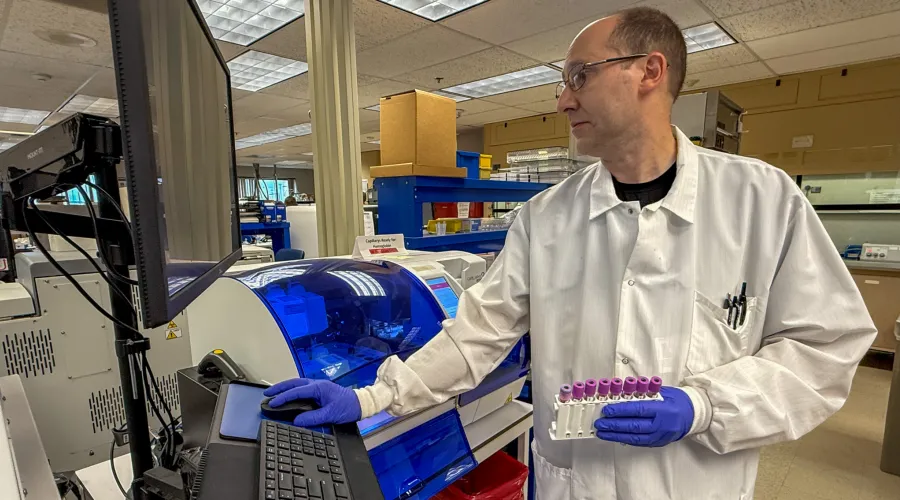
Microbiology
Facilities
The clinical microbiology laboratory is located in the southwest end of the HA pavilion of Albert B. Chandler Hospital. It contains two biosafety level 3 facilities, one shared by virology and molecular microbiology, and one shared by mycology and mycobacteriology. Clinical microbiology also shares facilities with immunomolecular pathology, the genomics core facility, and laboratory central/accessioning. Rapid testing for clinical microbiology also occurs at the Good Samaritan laboratory.
Clinical microbiology prides itself on their employee diversity. They have employees from four countries, other than the US, and eight states other than Kentucky.
Faculty
Julie A. Ribes, MD, PhD, D (ABP)
Director of Clinical Microbiology
Vaneet Arora, MD, MPH, D (ABMM)
Associate Director of Clinical Microbiology
Wael Ibrahim, MBChB
Supervisory Staff
Sandra Mills, MT (ASCP)
Chief Technologist, Microbiology
Jeffrey Roberts, BS (ASCP)
Supervisor, Clinical Microbiology
Services
Clinical microbiology covers a wide scope of practice. We provide services ranging from accessioning, processing, bacteriology, molecular microbiology, mycology, mycobacteriology, parasitology, and virology. Note that although the faculty have responsibility over infectious disease serology, send out testing, and point of care testing, these services fall under the umbrella of special chemistry due to the shared use of instrumentation for this diagnostic testing. The medical director actively participates in infection control, public health, and stewardship activities on an institution-wide and Commonwealth-wide basis.
Education
Clinical microbiology has traditionally participated in a wide array of student teaching including educational opportunities from high school students, undergraduate MLS students, medical students, residents, and fellows from pathology, pharmacy, infectious diseases, and pediatrics. Faculty are also involved in a graduate level education through the College of Medicine Graduate Medical Education office, the College of Pharmacy, and the College of Public Health.
The resident rotation is a robust eight-week session with daily assignments for wet bench experiences. This is complimented by lab rounds with the lab directors, infectious disease conferences and web-based learning activities. A third four-week rotation, the senior resident rotation in clinical microbiology, occurs in the residence third or fourth year in our a PCP program. This consists of assignment to a quality assessment project, validation, or quality improvement initiative. Residents will still attend daily didactic sessions and laboratory rounds and will complete self-assessment exams in microbiology. Residents and fellows may select one or more quality assurance projects, IQCP activities, or research projects for poster presentations or for publication. Residents may be invited to participate in validations of new technologies for implementation in the clinical lab setting.